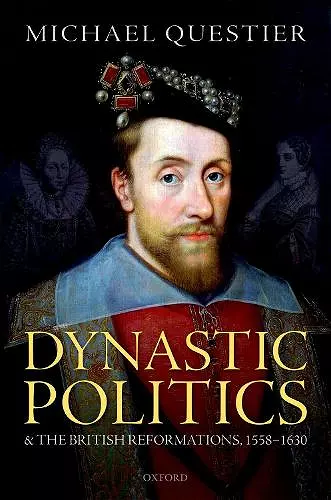Dynastic Politics and the British Reformations, 1558-1630
Format:Hardback
Publisher:Oxford University Press
Published:31st Jan '19
Should be back in stock very soon

Dynastic Politics and the British Reformations, 1558-1630 revisits what used to be regarded as an entirely 'mainstream' topic in the historiography of the later sixteenth and early seventeenth centuries - namely, the link between royal dynastic politics and the outcome of the process usually referred to as 'the Reformation'. As everyone knows, the principal mode of transacting so much of what constituted public political activity in the early modern period, and especially of securing something like political obedience if not exactly stability, was through the often distinctly un-modern management of the crown's dynastic rights, via the line of royal succession and in particular through matching into other royal and princely families. Dynastically, the states of Europe resembled a vast sexual chess board on which the trick was to preserve, advance, and then match (to advantage) one's own most powerful pieces. This process and practice were, obviously, not unique to the sixteenth and seventeenth centuries. But the changes in religion generated by the discontents of western Christendom in the Reformation period made dynastic politics ideologically fraught in a way which had not been the case previously, in that certain modes of religious thought were now taken to reflect on, critique, and hinder this mode of exercising monarchical authority, sometimes even to the extent of defining who had the right to be king or queen.
Michael Questier's new book is proudly old-fashioned, offering a narrative history of dynastic politics-the business of monarchical succession, royal marriages, and intradynastic alliance-in the Elizabethan,Marian, Jacobean, and early Caroline Britannic Isles. In other ways, the book is defiantly original. * Alastair Bellany, Journal of Modern History *
The book largely accomplishes what Questier wants it to. It retells the oft-told political narrative of the ruling British dynasties after the Reformation but including perspectives that have been overlooked or simply discarded. The result is a fuller and more rewarding story, one that captures the centrality of religion and dynastic succession to many of the significant political disputes of the post-reformation in Britain and Ireland (and the Continent too). The book will be of interest to anyone who studies domestic and international politics from 1558 to 1630 in England, Scotland, Ireland or elsewhere on the Continent. * Jason C. White, Reformation *
Pugnacious, peppery and lively, Dynastic Politics and the British Reformations, 1558-1630 succeeds in reintroducing and reintegrating Catholic voices into the 'mainstream' narrative, Questier railing against the historiographical tendency to view Protestantism as the consensus option. As far as contemporaries were concerned, religion and politics were up for grabs; there was nothing guaranteed about Protestant success. * James E. Kelly, Journal of Ecclesiastical History *
This book offers a nuanced take on the place of religion in the world of political history, recognising that there was no single "Catholic" political position in this period, but rather a variety of views that changed in responseto political developments. ... I would certainly recommend this book to readers who want to read about the lesser-known Catholic perspective on well-known events in Elizabethan and Jacobean history. * Joseph Massey, Royal Studies Journal *
Uncovering this Catholic strand at the center of British politics has been a major part of Questier's work ... Questier places the loyalist English Catholic laity in a central, if not a crucial, role in British dynastic and religious policy, rescuing them from both the rhetoric of their Protestant opponents and from the condescension of those Catholic historians who would wish for a more positively Roman expression of their faith. This is an important contribution of this deeply researched and densely argued book. * W. J. Sheils, Journal of British Studies *
Questier emphasizes that this is not counter-factual history, but alternative histories can be felt hovering in the background. What if Elizabeth I had been deposed and replaced by Mary Queen of Scots? What if the Armada or the Gunpowder Plot had succeeded? Questier delineates a world in which those things remained possibilities. ... by "incorporating the ideological fissures and fractures", Michael Questier has supplied us with a valuable sense of how contested, divisive and rebarbative the early modern political process remained. * Lucy Wooding, Time Literary Supplement *
ISBN: 9780198826330
Dimensions: 236mm x 164mm x 33mm
Weight: 898g
518 pages